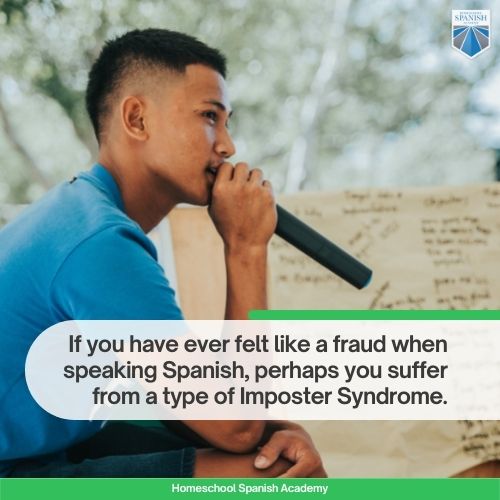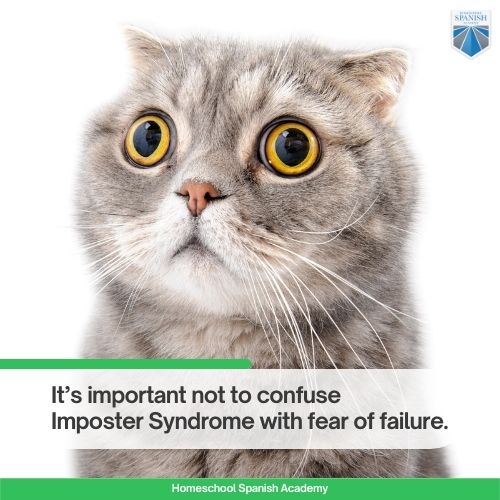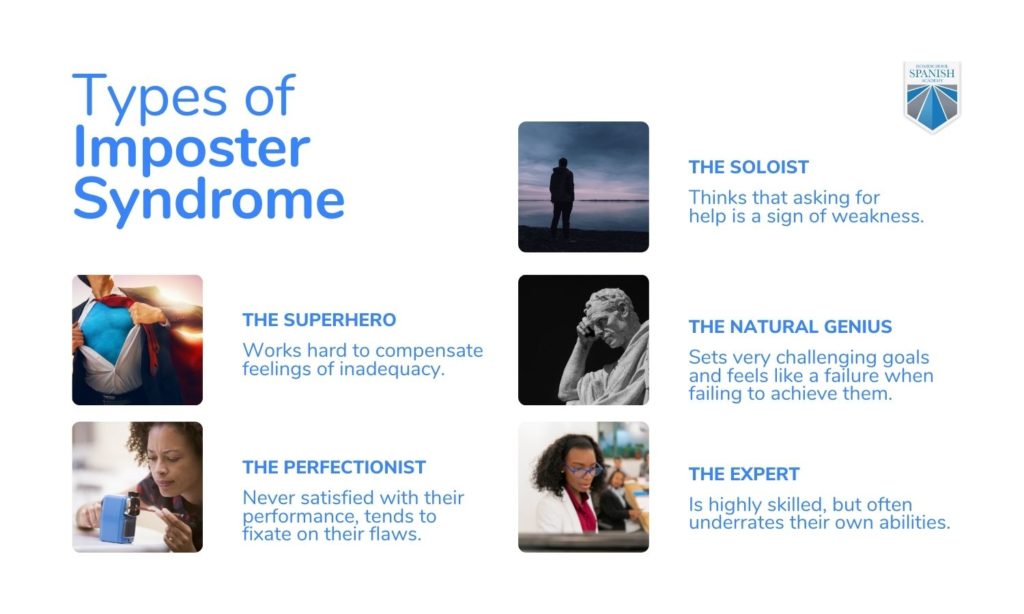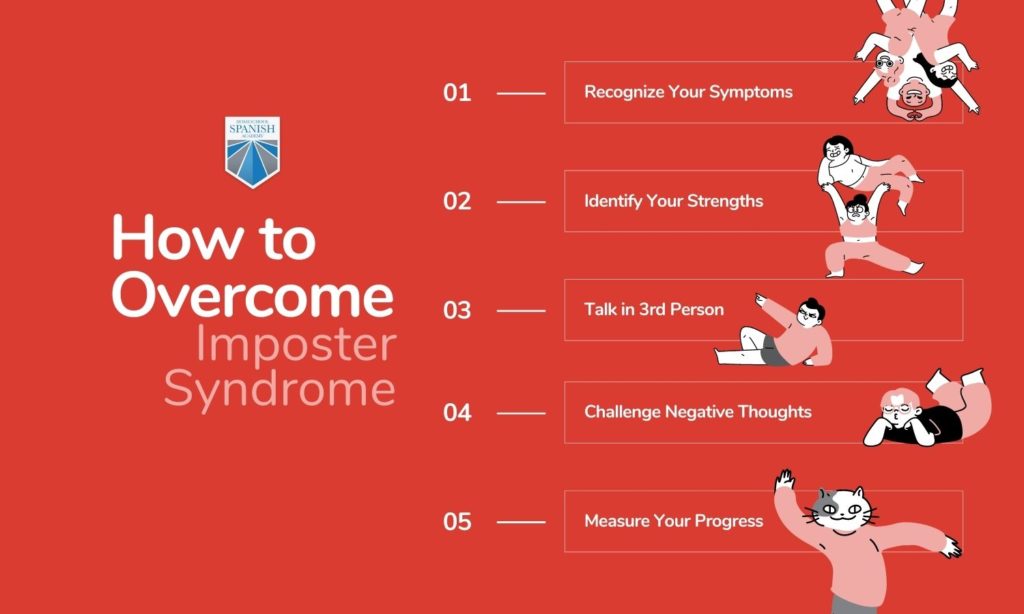
How to Overcome Imposter Syndrome When Learning Spanish
Imposter Syndrome is a common ailment among new language learners. The feeling that you don’t really know the language, even though you communicate in it and seem to know your way around it.
If you have ever felt like a fraud when speaking Spanish, perhaps you suffer from a type of Imposter Syndrome. Keep reading to learn what Imposter Syndrome is, what its symptoms are, what may cause it, and what types of this disorder are there.
Finally, I’m also including a few useful strategies to cope with it and not allow it to affect your language learning progress.

What Is Imposter Syndrome?
The term Imposter Syndrome (IS) was first coined in the 1970s by psychologists Pauline Rose Clance and Suzanna Imes, and refers to the experience of feeling like a fake, a fraud, thinking that you aren’t up to the task.
In other words, the imposter syndrome meaning refers to “believing you are not as competent as others perceive you to be.” People that suffer from Imposter Syndrome, also known as Imposter Effect, feel inadequate even when the evidence shows adequacy and success.
It’s important not to confuse Imposter Syndrome with fear of failure. Imposter Syndrome isn’t about feeling that you can’t do it, and being scared of the upcoming failure. It’s more about “knowing” that you can’t do it and being scared of being discovered, of being exposed as a fraud.

Symptoms
Imposter Syndrome is an overall sense of self-doubt about your own abilities and some of its most common symptoms are:
- A feeling of being a fraud.
- A strong fear of being discovered.
- Fear of failing to live up to expectations.
- Difficulty recognizing your own success.
- Sabotaging your own success.
What Causes It?
Psychologists have identified some possible causes for the anxiety provoked by Imposter Syndrome. For instance, starting a new role (like getting a new job or your first day at university) can trigger the feelings associated with the imposter effect.
A study suggests that Imposter Syndrome may start with families “characterized by low support and high conflict.” In general, family backgrounds and personality traits are usually mentioned as possible causes of IS, although it’s accepted that Imposter Syndrome is most likely caused by a diversity of factors.
Types of Imposter Syndrome

There are different types of Imposter Syndrome, psychologists have identified these as the most common ones:
The Superhero
This person feels so inadequate that overcompensates by pushing himself or herself to the limit, working as hard as possible in order to not be discovered.
The Perfectionist
A typical trait of Imposter Syndrome is perfectionism. These individuals are never satisfied with their performance, they can’t focus on their strengths, and tend to fixate on their flaws.
The Soloist
Soloists think that asking for help is a sign of weakness or incompetence, so they prefer to go alone and do it all themselves.
The Natural Genius
These people tend to set very challenging goals for themselves, only to feel like a failure when they can’t achieve them.
The Expert
People who suffer from this type of Imposter Effect may be highly skilled, with a lot of preparation and expertise, but they would keep underrating their own abilities.
Imposter Syndrome and Speaking Spanish
How does Imposter Syndrome relate to speaking Spanish and the learning of a new language? Well, many Spanish learners suffer from Imposter Syndrome as they don’t feel confident in their own language skills.
Have you ever felt that your pronunciation isn’t the best or that you don’t really speak the language yet even when you’ve been studying it for a long time?
This is a very common feeling among language learners, it doesn’t matter if we’re talking about English, Korean, or Spanish. It’s just normal that you compare yourself to a native speaker of your language goal, and feel like you aren’t right there just yet.
You’re focusing on your flaws, you’re minimizing your skills, and underrating your success. If you’re doing all that perhaps you suffer from some type of Imposter Syndrome.
How Does Imposter Syndrome Affect Your Well-Being and Learning Progress?
At this point, it’s very important to mention that Imposter Syndrome is a mental health disorder and if you think that you suffer from it and it’s affecting your well-being, you should contact a mental health professional. These types of disorders may seem simple at first sight, but they tend to be just the tip of the iceberg of bigger issues.
Besides affecting your well-being, developing an overall feeling of self-doubt, depression, frustration, and shame, Imposter Syndrome can also affect your personal relationships and professional life, as well as your learning progress.
If you can’t recognize your own progress in Spanish, if you don’t appreciate the language skills you have acquired and developed over time, this can push you to lose your motivation to continue learning and may eventually lead you to quit altogether your language learning efforts.
How to Overcome Imposter Syndrome

It’s normal to feel overwhelmed by the magnitude of the task of learning a new language, just don’t let that feeling take over and control your perception about your own skills.
These are some useful strategies to help you overcome it:
Recognize Your Symptoms
As with every problem, the first step is to recognize that you have a problem. Think about the symptoms and characteristics I’ve talked about on this post, and question yourself if you feel identified with any of those traits. If you don’t first recognize you have Imposter Syndrome, you can’t overcome it.
Identify Your Strengths
Nobody is bad at everything all the time. We all have our strengths. Yes, even in Spanish. Look for them, find them, feel good about it, recognize your effort, and use them to your benefit and to reinforce your sense of achievement.
Talk in 3rd Person
Research suggests that talking in third person works as a regulatory mechanism and may help you cope with Imposter Syndrome. Talking positively about yourself in the third person makes you feel good and increases your motivation to keep learning.
Challenge Negative Thoughts
We’ve all done it. It seems like we love to deprecate ourselves. To minimize our achievements and underrate our success. But, how about you challenge those self-deprecating thoughts? What if you reply to your own mind challenging those negative ideas? What if you give yourself some love for a change? Perhaps you aren’t fluent in Spanish yet, so what? You’re a work in progress, and your achievements so far can’t be denied. Focus on the positive.
Measure Your Progress
By keeping track of your learning progress and measuring your language fluency, you can have an objective reference point about your own Spanish skills. By keeping track of your progress, you can check what’s working and what isn’t, and keep improving your language learning process.
Stay Calm and Learn Spanish
Don’t let Imposter Syndrome get in the way of your language learning process. Remember that it’s normal to feel insecure about your own Spanish skills, just focus on the positive and keep going. You’ll get where you want to get, just need to be patient and keep working hard to achieve your goals.
Speak in a low-stress, safe environment with our certified, friendly teachers from Guatemala. Sign up for a free class with us at Homeschool Spanish Academy where we offer flexible scheduling and tailored Spanish packages!

Want more Spanish resources? Check these out!
- All You Need to Know About Spanish as a Second Language
- Discover the Joy of Learning Spanish with Summer Fun Activities
- Are Bilingual Children More Likely to Experience a Speech or Language Delay?
- Language Learning with Netflix: How to Use the Chrome Extension
- Turn Your Life Around: From Passive Bilingualism to Fluency!
- The Beauty of Spanish Sign Language
- Multilingual Mastery: How Many Languages Can You Learn?
- The Journey of Becoming Trilingual
- All You Need to Know About Spanish as a Second Language - July 11, 2024
- The Best Homeschool Spanish Curriculum at HSA - June 13, 2024
- 20 Most Common Subjunctive Triggers in Spanish - May 23, 2024




